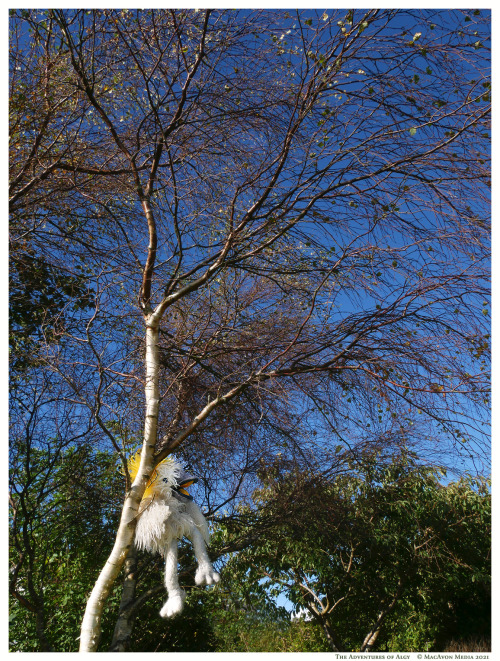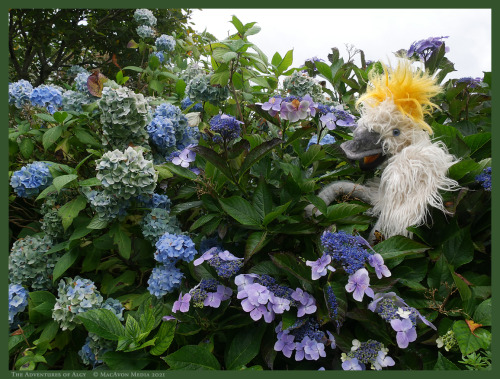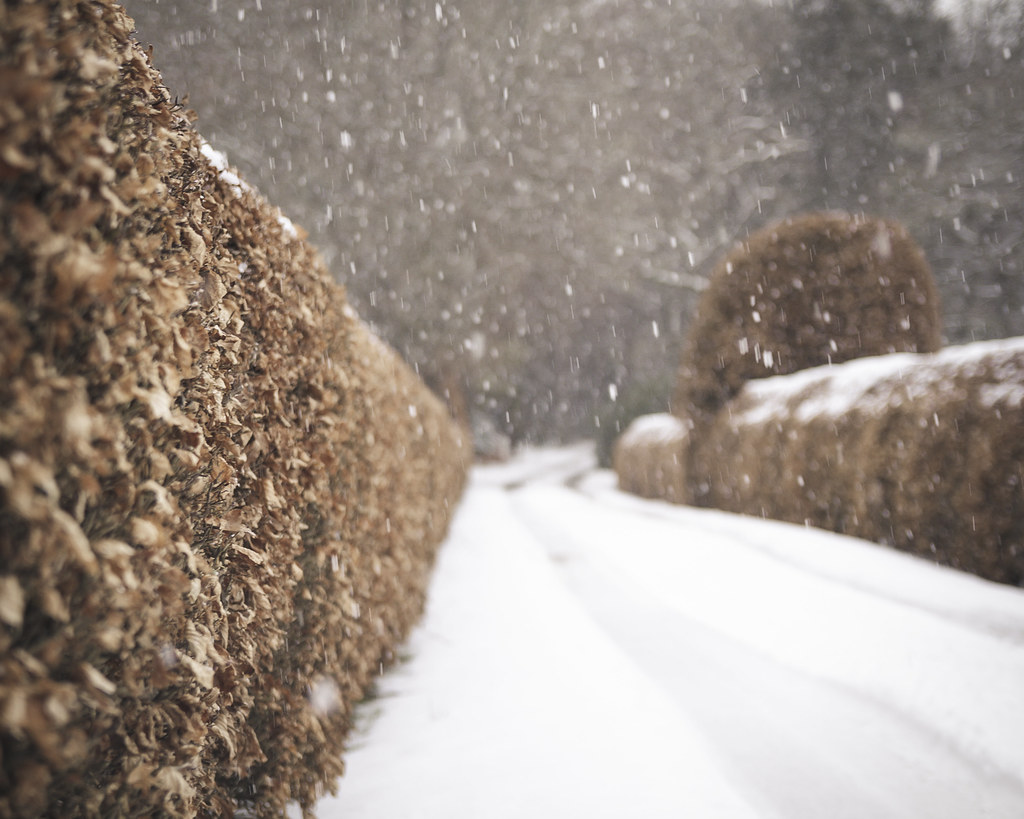#scottish weather
It was a damp, dark and dismal sort of day, and Algy had that inevitable “HOW long did you say it was till spring?” October Tuesday feeling…
When he could see the sky at all it was a uniform pale grey from edge to edge, but that was only when it was not obscured by a thick blanket of fine Scotch mist, which descended at intervals throughout the day, sprinkling everything with minute drops of water, lifting only briefly from time to time to reveal the blank sky before it settled down again.
Looking for a place which provided sufficient shelter for a fluffy bird to relax and ponder on life, the weather, and the seasons, Algy spotted an inviting ivy-covered nook by an old stone wall, and there he reclined, tucking himself in among the dense foliage which, owing to the “mild” temperate Celtic rainforest climate, was still lush and green.
For once there was no wind… no wind at all… and everything was muffled and hushed by the dense Scotch mist, with the silence broken only by occasional faint and muted natural sounds. At odd moments the robins tweeted snatches of unfinished songs, and twice Algy heard geese calling as they flew overhead. He would have loved to see them, for the arrival of the migratory geese in autumn was something to celebrate, but on the first occasion he could see nothing at all but the mist, and the second time he saw only some faint, shadowy shapes passing high overhead.
And then suddenly the silence was broken by a quiet but insistent and strangely ominous rumbling, which quickly grew rather louder and nearer, then just as quickly rolled away again, with a faint trembling of the ground as it passed. It lasted for only a matter of seconds, but Algy felt rather shaken even so, for all creatures respond instinctively to an earthquake, even if it is only a tiny wee one. (Algy is quite sure that his Californian friends, and others who live in earthquake zones, would laugh at the trifling shakes experienced in the Scottish Highlands!).
Once he was sure that everything was calm and still again, Algy leaned back in the ivy, wondering what poems had been written about such a plant. He searched the recesses of his fluffy bird brain, and for a while he could think of nothing, but then some old verses by one of Britain’s most famous authors came back to him:
Oh, a dainty plant is the Ivy green,
That creepeth o’er ruins old!
Of right choice food are his meals, I ween,
In his cell so lone and cold.
The wall must be crumbled, the stone decayed,
To pleasure his dainty whim:
And the mouldering dust that years have made
Is a merry meal for him.
Creeping where no life is seen,
A rare old plant is the Ivy green.
Fast he stealeth on, though he wears no wings,
And a staunch old heart has he.
How closely he twineth, how tight he clings,
To his friend the huge Oak Tree!
And slily he traileth along the ground,
And his leaves he gently waves,
As he joyously hugs and crawleth round
The rich mould of dead men’s graves.
Creeping where grim death has been,
A rare old plant is the Ivy green.
Whole ages have fled and their works decayed,
And nations have scattered been;
But the stout old Ivy shall never fade,
From its hale and hearty green.
The brave old plant, in its lonely days,
Shall fatten upon the past:
For the stateliest building man can raise,
Is the Ivy’s food at last.
Creeping on, where time has been,
A rare old plant is the Ivy green.
[Algy is quoting the poem The Ivy Green by the 19th century English author Charles Dickens.]
Post link
The weather was in a highly erratic mood, swinging rapidly between glorious autumn sunshine which revealed a sky of a most unusual colour for the wild west coast of the Scottish Highlands, and huge sulky grey clouds which drained all the colour out of the landscape and brought yet more rain to the already sodden ground.
Algy waited patiently for one of the better moments, then hopped up into a wind-twisted silver birch tree. Although many of the trees were still green, the birches had already lost their leaves, and their delicate red-brown branches were swaying gently against the beautiful blue sky… at least until the next wave of clouds arrived.
Watching the last wee birch leaves flutter down to the ground, Algy remembered a lovely poem by Mary Oliver, who in his opinion had composed some of the most wonderful Nature poetry ever written. Opening his beak to its fullest extent, Algy recited at the top of his voice, for the benefit of any creature who might happen to be listening:
Don’t you imagine the leaves dream now
how comfortable it will be to touch
the earth instead of the
nothingness of the air and the endless
freshets of wind? And don’t you think
the trees, especially those with
mossy hollows, are beginning to look forthe birds that will come – six, a dozen – to sleep
inside their bodies? And don’t you hear
the goldenrod whispering goodbye,
the everlasting being crowned with the first
tuffets of snow? The pond
stiffens and the white field over which
the fox runs so quickly brings out
its long blue shadows. The wind wags
its many tails. And in the evening
the piled firewood shifts a little,
longing to be on its way.
[Algy is quoting the poem Song for Autumn by the 20th/21st century American poet Mary Oliver.]
Post link
The following day was somewhat calmer but continued persistently wet, although the rain was evidently getting fed up with falling the entire time, as it only dribbled aimlessly, on and off, in a decidedly half-hearted and desultory sort of way, no doubt having exhausted itself in the torrential downpours of recent days.
Algy reclined on the rough concrete step in his assistants’ new front gateway, gazing out across the still-green croft land to the brown peat bogs and hillsides beyond, wishing that his assistants had thought to provide some kind of waterproof cushion for the benefit of fluffy birds who did not much care for cold, damp tail feathers. The mist had cleared sufficiently to see the grey, blurry shapes of two out of the three islands which should be visible from that spot, although it looked as though they might vanish again at any moment, as things so often did on the wild west coast of the Scottish Highlands…
At first there was no sign of sentient life of any kind, and Algy contemplated the dreich October day alone, but eventually a lone wanderer ambled by and paused for a moment to exchange a few words.
“How’re ye doing?” enquired the sheep, adopting the form of greeting common to most local residents in that area.
“No so bad,” replied Algy, in the same manner. “And yourself?”
“Baaaaaaaaaaa!” bleated the sheep, and turning its head away it slowly walked away, leaving Algy alone on the step once again.
Algy hopes that if you should find yourself in a similar situation this Sunday, you will at least have the benefit of a wee bit of conversation with some fellow creature, even if it is only a sheep… but just in case you do not, he sends you all lots of damp but very fluffy hugs xo
Post link
It was the firsd day of October, and instead of the fine, dry spell which Algy expected in the west Highlands of Scotland at this time of year, the weather was increasingly stormy, with wild winds, torrential rain, and the occasional thunderstorm bringing battering showers of icy water and hailstones.
But in between the squalls there were occasional periods of calm, and Algy took advantage of one such respite to check on his assistants’ hydrangeas, which grew in a relatively sheltered spot. Algy loved the hydrangeas, for one variety produced the clearest powder blue, and the other had fascinating flower heads with deep, dense blue centres that attracted the bees when the weather was kinder, surrounded by lovely mauve bracts (or were they petals?) around the outsides.
It was a wee bit late in the season now, and the hydrangeas were obviously past their best, but Algy was very glad that he had not missed them entirely. Shivering slightly as he perched in the damp bush, Algy studied the flowers and reflected on the changing of the seasons. He was reminded of an odd wee poem by one of his favourite American poets, although his mood was by no means as sombre as that of Mr. Sandburg… and nor were Algy’s hydrangeas white, so they therefore faded rather more gracefully, the colour simply leaching out of them as the season advanced:
Dragoons, I tell you the white hydrangeas turn rust and go soon.
Already mid September a line of brown runs over them.
One sunset after another tracks the faces, the petals.
Waiting, they look over the fence for what way they go.
Algy wishes you all a safe and happy weekend, and hopes that you will be able to find some flowers to brighten your days, wherever you happen to live
[Algy is quoting the poem Hydrangeas by the 20th century American poet Carl Sandburg.]
Post link
Algy thoroughly enjoyed his wind-driven ride in the old downy birch tree, but after a while he began to feel hungry again, for he had only managed to eat a few rowan berries before the wind had defeated him.
Fortunately there was a handsome cotoneaster growing close to the birch, and it was absolutely smothered in beautiful red berries which the other birds had not yet removed. A single hop and a flutter took Algy into the centre of the bush, where, seating himself comfortably, he began to eat a very hearty lunch, reflecting the while on Nature’s generosity towards fluffy (and other) birds.
Algy was inevitably reminded of John Keats’ famous Ode, but despite the mellow fruitfulness which was so abundantly evident in his assistants’ garden this year, other aspects of the poem did not quite seem to fit the character of autumn in the wild west Highlands. Algy guessed that the young poet had had a more southerly clime in mind, for he knew that even back in Mr. Keats’ day the Hebridean coast and islands of Scotland were known for their stormy autumn weather. Algy recalled that entries for September days in James Boswell’s 1773 diary The Journal of a Tour to the Hebrides with Samuel Johnson (published in 1785) were full of observations such as “It was a storm of wind and rain; so we could not set out“… and very little seemed to have changed in that respect as the centuries had passed…
However, the poem conjured up a splendid vision of plenty, albeit in a mythical land of warm sunshine, and Algy was happy to recite it for the benefit of the other birds while he munched the ripe red berries. Mr. Keats had got one thing right at least: the red-breast was indeed whistling from a garden croft, and Algy was thrilled to be hearing his wee friend’s song once again:
Season of mists and mellow fruitfulness,
Close bosom-friend of the maturing sun;
Conspiring with him how to load and bless
With fruit the vines that round the thatch-eves run;
To bend with apples the moss’d cottage-trees,
And fill all fruit with ripeness to the core;
To swell the gourd, and plump the hazel shells
With a sweet kernel; to set budding more,
And still more, later flowers for the bees,
Until they think warm days will never cease,
For Summer has o'er-brimm’d their clammy cells.Who hath not seen thee oft amid thy store?
Sometimes whoever seeks abroad may find
Thee sitting careless on a granary floor,
Thy hair soft-lifted by the winnowing wind;
Or on a half-reap’d furrow sound asleep,
Drows’d with the fume of poppies, while thy hook
Spares the next swath and all its twined flowers;
And sometimes like a gleaner thou dost keep
Steady thy laden head across a brook;
Or by a cyder-press, with patient look,
Thou watchest the last oozings hours by hours.Where are the songs of Spring? Ay, where are they?
Think not of them, thou hast thy music too -
While barred clouds bloom the soft-dying day,
And touch the stubble-plains with rosy hue;
Then in a wailful choir the small gnats mourn
Among the river sallows, borne aloft
Or sinking as the light wind lives or dies;
And full-grown lambs loud bleat from hilly bourn;
Hedge-crickets sing; and now with treble soft
The red-breast whistles from a garden-croft;
And gathering swallows twitter in the skies.
[Algy is quoting the famous poem To Autumn by the early 19th century English poet John Keats.]
Post link
T-shirts last Saturday, now thundersnow and lightning tonight. Welcome to Scotland, where we’ve had rain, snow, hail, sun, thunder and lightning in one day.
On the Subject of Sheep
A Very Short Story
Andrew backed the pickup off the road, leaving it tucked in beneath the slope of the hill, facing up the road towards Corriemor. He got out of the vehicle slowly, feeling the pain in his left hip as it took his weight. The doctor wanted him to have it replaced, but if arthritis was God’s will, then he would suffer what he must.
He fetched his crook and leaned on it as he limped towards the back of the truck and lowered the tail gate. Jackie and Bob leapt down and ran backwards and forwards, sniffing at bushes, the youngster yapping excitedly and jumping in and out of the wee burn that ran behind the car, until the old man growled “Gerrarrerere!”. The two collies froze, stared at the old man for a moment, then obediently returned to their master and lay down on the thin grass by his feet.
Andrew turned and gazed up towards the ridge. A low cloud blew across the face of the slope, obscuring the peaks. The chilly wind would soon bring a thin rain down to the lower level. A dreich day, it was.
He turned to the dogs, who looked up at him attentively. Pointing up the slope with his crook, he murmured a few sentences in Gaelic, then made a noise that was half shriek and half whistle. The dogs bounded away in the direction he had pointed, and soon were out of sight on the hill.
Andrew got back in the pickup and turned on the radio. The local station was playing traditional songs of exile and longing, interrupted by the news in Gaelic. The rain arrived and spattered the windscreen, blurring the view outside. Andrew’s thoughts drifted through the rain out on to the hill where the sheep wandered loose, grazing on what little grass they could find this early in the year. He may have dozed off for a while.
A single distant bark made him open the car door, pull himself to his feet and stand in the stinging drizzle. A gust swept the mist aside, revealing the ewe and her twin lambs that he had set out to find. Jackie and Bob guided them towards the shepherd, running to outflank them whenever they tried to go off to one side, always making sure that the sheep followed a safe path and did not slip into a gulley or ditch.
As the animals drew near, Andrew shouted a few words of encouragement to the dogs, then retreated to the car. He started the engine and, as the dogs coaxed the sheep into the road and guided them deftly in the direction of the steading at Corriemor, he put the truck into first gear and followed them, driving sedately in the middle of the single-track road.
A man on the radio was talking about a report from the University of Stirling, which documented the catastrophic decline in the number of Gaelic speakers in Scotland. Andrew shook his head sadly. If this went on, by the time the grandchildren grew up, the men would have to be out on the hill every time they needed to find a lost ewe. On the subject of sheep, a man could never talk to the dogs in English.
[A Tumblr exclusive]
Post link







